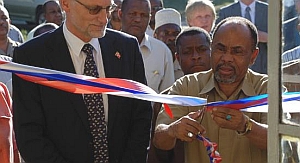Norway in Tanzania: The Battle Rages

 |
|
Deputy Chief Minister Mr. Ali Juma Shamhuna from Zanzibar and Norway's Ambassador to Tanzania, Mr. Jon Lomøy Photo courtesy |
My column ‘What is Norway oiling in Zanzibar?’ was a query aimed at furthering a public debate that would avert what might happen in 2010. However, it only managed to generate off-the-record responses. It is in this regard I highly appreciate Prof. Sherriff’s public response.
In an interesting way Norway provides an avenue for raising such a query. By “taking an active but not a leading role in finding a solution to the political impasse” in Zanzibar, to use Prof. Sherriff’s phraseology, Norway is helping us to make sense of what is at stake both globally and locally. I thus agree with the Professor that we need to “deal with the elephant in the room.”
As far as I understood him, this elephant is the ‘Union Question’ in relation to the ‘Zanzibar Question.’ Or as he put it, it “is the broader question of political relations between the people of Zanzibar, and its relationship with the Union.’ It is these that we need to focus on improving.
I am sure that Prof. Sherrif would agree that a number of my previous columns in The Citizen, particularly the one on ‘Beyond two-governments in Tanzania’ which was inspired by his co-written chapter on ‘One Step Forward, Two Steps Backwards: The State of Constitutionalism in Zanzibar-2007’, is a modest attempt to deal with this elephant. But the purpose of my rejoinder is not to be defensive. So let me focus on why I think it is important not to ignore the mouse either.
The areas that we call Tanzania and
We are talking here of an area that pitted the Portuguese against the ‘Arabs’ and the Germans against the British many years before the Norwegians came into the picture. As citizens of these areas and observers of the unfolding of historical and political events, it is natural to be curious or even cynical about any external intervention no matter how benevolent it may appear to be.
It is out of a similar kind of curiosity land rights activists questioned the way the Norwegian government financially supported the introduction of Hernando de Soto’s ideas of formalization in
Why, queried a number of activists, was the programme externally driven to the extent that its intellectual property was owned by a ‘consultant firm’ that was being paid exorbitant rates by the Norwegian government? Is this an example of empowering the poor as the programme purports to do they further queried? As far as I know these critiques have, partly, transformed Mkurabita.
So, it is in the same spirit we need to question the involvement of Norway in what is happening in and on
One such observer quipped: “I imagine one of the reasons for this Western interest in Zanzibar, the lead role being taken by Norway for obvious reasons (oil), is to make sure the CHINESE don’t get there first.” Another one noted: “Basically
The latter observer further noted: “The Norwegians have been in the forefront in Sri Lanka not to mention
Another observer, however, notes that Norway is attempting to ‘sell’ it’s relatively successful ‘oil model’ to developing countries. I tend to agree with him as the Norwegians are putting a lot of efforts in ‘teaching’ us to avoid the ‘resource curse’ associated with oil extraction. In fact in 2008 Norwegian People’s Aid (NPA) held an international conference in Tanzania on the matter.
The conference was aptly themed ‘Oil for the Common Good’. One of the positive lessons I learnt from its deliberations is that the government should not leave the oil industry at the mercy of oil companies. Rather, as it is the case in Norway, it ought to organize the state’s petroleum administration that is lean and has clear, non-overlapping, mandates. It should also monitor licensed companies’ operations and administer their compliance even during oil exploration.
Thus in a way I agree with Prof. Sheriff about the relatively positive role of Norway in international politics. My main concern, however, is to look beyond the (‘positive’) surface. It is about questioning everything that is done everywhere in our country by everyone from ‘outside’.
This is the ‘sceptical’ approach to ‘philanthropy’ that I learnt from someone who died while busy chasing both the mouse and “elephant in Zanzibar”. Ironically his book is entitled ‘Environment, Aid and Politics in Zanzibar.’ His caution about our analytical biases is still very relevant today:
“The simple answer is, rather than searching for historical truths, which would deal with the current crisis, politicians and analysts of the situation in Zanzibar are more concerned with the suppression of certain approaches and giving credence to others” (The Citizen 20 October 2006).
By Chambi Chachage
Independent Researcher, Newspaper Columnist and Policy Analyst based in Dar-es-Salaam, Tanzania.
